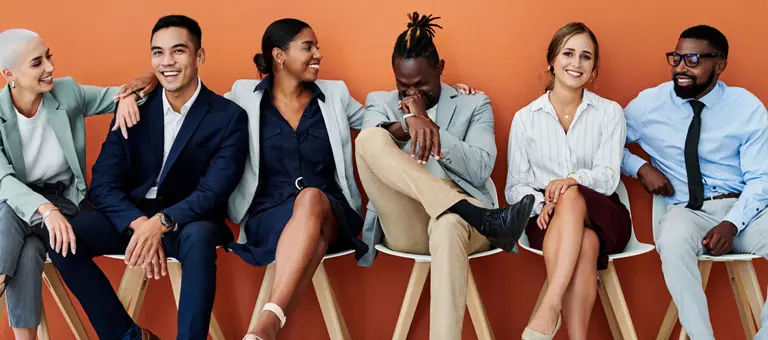Introducing Jennifer Cook, an expert in organisational and operational transformation and a leader in Baringa’s Ethnic Diversity Network.
Before anything else, I should note the title of this blog is a play on the words of a fantastic book titled Why I’m No Longer Talking to White People About Race by Reni Eddo-Lodge. If you haven’t already, I’d recommend reading it as part of your anti-racism journey.
As a white woman at Baringa and an ‘ally’ for ethnic equality and diversity, I’m striving for a world where we can all stand proud of our success without the bittersweet. The bittersweet knowledge that success is easier for some people than it is for others, simply because of the colour of our skin.
And although I don’t have the lived experience of a person of colour, my role as ‘ally’ means I’m committed to thinking beyond ingrained core beliefs about race, challenging others to do the same and making sure we keep the conversation going.
Learning the language of diversity
I grew up in Erdington, a culturally diverse area of Birmingham. Immersed in predominantly black social circles, I knew life was different for my black friends, but I couldn’t quite articulate why. It was only when I studied sociology at A-Level and at university, that I was given the language to talk about the things I was seeing.
Things like ‘code-switching’ where my black friends would make subtle changes to the way they did their hair or how they spoke at school, so that they didn’t get into trouble. And working in a pub, I saw instances of what I would later identify as people ‘weaponising’ their whiteness during altercations and in front of the police.
Afterwards, going to university in the multi-ethnic area of New Cross, London, felt like a bit of a homecoming! I joined the Afro-Caribbean Society (ACS) and although I couldn’t entirely relate with their lives, I began to understand the lived experiences of my fellow black students. It sparked my decision to explore the topic ‘Does Race Matter?’ for my final dissertation, exploring ‘race’ as a social construct.
Why do I care?
Many people ask why, as a white woman, I care about ethnic diversity? My standard response is, “Why don’t you?” Because even skimming the surface of British history I can’t help but be compelled to try to change things. The simple truth is, it’s up to us as white people to challenge the core beliefs we’ve been brought up with. The complex understanding of what it means to be British. The bogus notion of purity and beauty in a fair complexion and lighter hair.
Even though I engage with many diversity networks throughout Baringa, I prioritise ethnic diversity. Because I strongly believe that coupling ethnicity with any other identity puts you at a disadvantage in society as it is today. Prioritising race is the only way to move the dial and make real change.
But mostly, I know the exhaustion that exists within ethnic diversity networks. For me, I can pick up my activism and drop it again. But for a person of colour, the challenges they face exist all day, every day. So, I maintain an energy that isn’t always possible for others. I try to use my white privilege to say, “Bring on the controversy! Let me be the gobby one!”
Subtly changing our culture for the better
On joining Baringa, I asked a lot of hard-hitting questions about the company’s commitment to ethnic diversity. Having previously held roles in other Ethnic Diversity Networks, I wasn’t willing to take a step back.
I’m now part of the Ethnic Diversity Network (EDN) Leadership Team, promoting organisation-wide engagement with the EDN agenda. I’m proud of strides Baringa has made. Like our recent Black at Baringa launch, which focuses on attracting, and more importantly, retaining the best black heritage talent, starting with organising our flagship Black History Month celebrations. I am also proud of our recent South Asian Heritage Month and upcoming Hispanic and Latin American Heritage month events.
We’ve also rolled out a ‘Tea Breaks’ initiative. Taking the very British notion of an afternoon tea and using it as an opportunity to have open and courageous conversations about race. Many teams across the business are regularly doing this – and the feedback has been overwhelmingly positive. It’s a small initiative but it’s subtly changing our language and culture for the better.
Where we could do better
But there’s still more work to be done. While we’re clearly committed to anti-racism, shown by our recently published Ethnicity Pay Gap Report, there needs to be a conscious Baringa-wide drive towards increasing ethnically diverse talent at senior levels, especially black heritage talent.
We need to get more vocal about celebrating our differences and acknowledging the contribution of different cultures across Baringa.
As individuals, if we get out of our comfort zone and talk through the tough topics, then we’re on our way to making a difference. And it’s no use getting defensive when we’re challenged on issues of race. Only once we accept that, in my opinion, most people in the UK have been raised to blindly accept their privilege and racial biases, can we embark on a journey of unlearning and relearning. A journey that’s essential in making real, lasting change.
